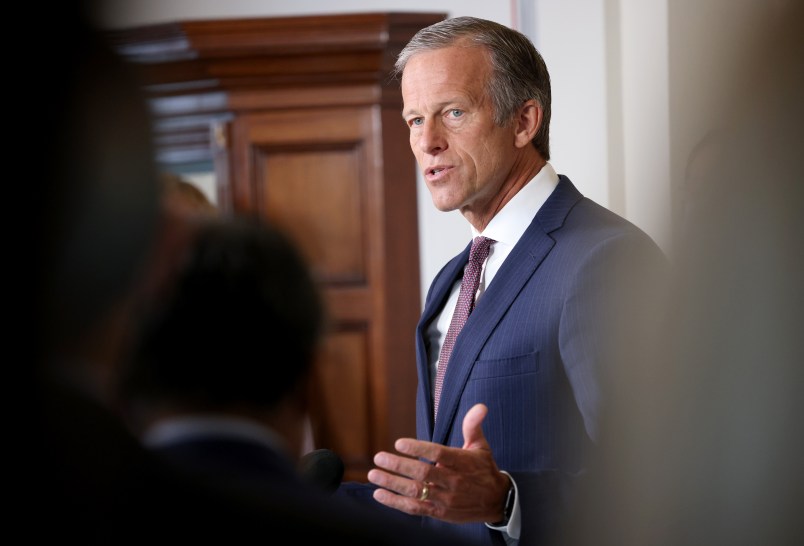Senate Republicans are candidly admitting their political calculus in opposing a January 6 commission: they don’t want it to encroach on the 2022 midterms, during which they worry it would be “weaponized politically.”
In other words, they don’t want voters reminded of the attack their leader and party provoked as they mull over their ballots.
Sen. John Thune (R-SD), the Senate minority whip, told reporters that he didn’t want the probe “weaponized politically and drug into next year.”
“A lot of our members, and I think this is true of a lot of House Republicans, want to be moving forward and not looking backward,” he said. “Anything that gets us rehashing the 2020 elections I think is a day lost on being able to draw a contrast between us and the Democrats’ very radical left-wing agenda.”
Up until this point, the 2022 factor has been more tacit in Republicans’ opposition than explicit. A commission of the sort proposed in the House bill encompassing the attack and “influencing factors” — e.g. the conspiracy theories peddled by former President Donald Trump and his GOP allies — would keep focus squarely on the sins of the Republican party. In recent days, Republicans have channeled this concern more through complaints about the commission’s scope, seeking to zoom out so far that Trump’s and their culpability seem insignificant.
Sen. John Cornyn (R-TX) told reporters Wednesday that the midterm knock-on effect was a feature, not a bug, of the bipartisan commission proposal.
“Part of the concern is that’s the plan. That’s Pelosi’s plan,” he said, adding that it would be “Democrats’ dream” to make the midterms all about the Capitol insurrection.
The commission proposal did not come from House Speaker Nancy Pelosi (D-CA) but from House Homeland Security committee chair Bennie Thompson (D-MS) and ranking member John Katko (R-NY) late last week. The legislation, expected to pass the House Wednesday evening, mandates that the commission’s report on its findings be given to Congress and the President by December 31, 2021.
On Tuesday, even after House Minority Leader Kevin McCarthy (R-CA) expressed his opposition to the bill — one he reportedly deputized Katko to work on — it seemed like there might be some Republican defections.
Multiple House GOP members claimed to still be mulling it over, and a last minute whipping effort indicated some nerves from leadership. Some Republican senators expressed openness too, most notably Sen. Mike Rounds (R-SD) who said he supported an independent January 6 commission. Rounds is a mainstream Republican and dependable GOP vote whose receptiveness seemed more indicative of broader caucus feelings than the outliers like Sens. Mitt Romney (R-UT) or Lisa Murkowski (R-AK).
But on Wednesday morning, that momentum was quashed by Senate Minority Leader Mitch McConnell (R-KY), who expressed his opposition to the commission in a floor speech.
Soon after, Rounds said he’d changed his mind.
“It would appear that under the layout that they’ve got this probably could not get started with a staff approved until late this year — that’s way too late, way too long to get the folks in with the appropriate security clearances to go through everything,” he told reporters.
He said that he’d had an “informal coffee” with McCarthy and about 14 other Republican senators Wednesday morning where he discovered that he was dissatisfied with the partisan nature of the proposal, pointing to the power of the Democratic chair to staff the commission. When a reporter pointed out that the staffing clause was virtually identical to that of the widely-praised 9/11 commission, he said that he wouldn’t be able to identify the “differences or comparisons.”
Some Senate Republicans are still expressing openness to the commission, though that flirtation with bipartisanship seems restricted to the usual suspects. And even then — it’s all in the timing.
“I also think it’s important that this be independent and nonpartisan and that means that we should make sure that the work is done this year, and does not go over into the election year,” Sen. Susan Collins (R-ME) told reporters Wednesday afternoon. “There’s plenty of time to complete the work.”







Translation: Let’s get this done quickly and on the down low, or drag it out past the midterms, but giving this the time it obviously deserves is a non-starter.
Of, course if the Repubes were on the other side of this, they would not hesitate to “color the midterms”. Maybe they should’ve agreed to this earlier, so the investigation would be done by that time. Tough shit.
Simply not fair to go ahead with a Jan 6th commission when there are still 30,000 e-mails on Hillary’s server that we have yet to see.
Sort of like the FBI investigation of Kavanaugh: a pro forma display designed not to find anything serious.
Shorter GQP: “We support sedition and voter suppression, but Shhhhhhhhh. We have an election to win next year.”